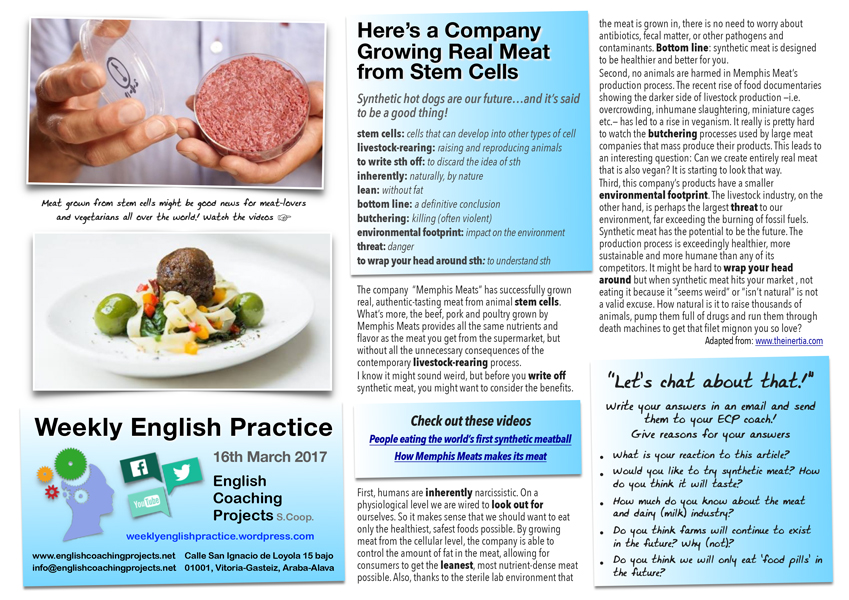Click on the image to download the pdf
Synthetic hot dogs are our future…and it’s said to be a good thing!
Vocabulary. Read and check you understand this before you read and listen to the article:
stem cells: cells that can develop into other types of cell
livestock-rearing: raising and reproducing animals
to write sth off: to discard the idea of sth
inherently: naturally, by nature
lean: without fat
bottom line: a definitive conclusion
butchering: killing (often violent)
environmental footprint: impact on the environment
threat: danger
to wrap your head around sth: to understand sth
The company “Memphis Meats” has successfully grown real, authentic-tasting meat from animal stem cells. What’s more, the beef, pork and poultry grown by Memphis Meats provides all the same nutrients and flavor as the meat you get from the supermarket, but without all the unnecessary consequences of the contemporary livestock-rearing process.
I know it might sound weird, but before you write off synthetic meat, you might want to consider the benefits.
First, humans are inherently narcissistic. On a physiological level we are wired to look out for ourselves. So it makes sense that we should want to eat only the healthiest, safest foods possible. By growing meat from the cellular level, the company is able to control the amount of fat in the meat, allowing for consumers to get the leanest, most nutrient-dense meat possible. Also, thanks to the sterile lab environment that the meat is grown in, there is no need to worry about antibiotics, fecal matter, or other pathogens and contaminants. Bottom line: synthetic meat is designed to be healthier and better for you.
Second, no animals are harmed in Memphis Meat’s production process. The recent rise of food documentaries showing the darker side of livestock production —i.e. overcrowding, inhumane slaughtering, miniature cages etc.— has led to a rise in veganism. It really is pretty hard to watch the butchering processes used by large meat companies that mass produce their products. This leads to an interesting question: Can we create entirely real meat that is also vegan? It is starting to look that way.
Third, this company’s products have a smaller environmental footprint. The livestock industry, on the other hand, is perhaps the largest threat to our environment, far exceeding the burning of fossil fuels. Synthetic meat has the potential to be the future. The production process is exceedingly healthier, more sustainable and more humane than any of its competitors. It might be hard to wrap your head around but when synthetic meat hits your market , not eating it because it “seems weird” or “isn’t natural” is not a valid excuse. How natural is it to raise thousands of animals, pump them full of drugs and run them through death machines to get that filet mignon you so love?
“Let’s chat about that!”
Write your answers and send them by email to your ECP coach. Why not record your voice too? Listen to yourself speak and identify what you have to improve on 🙂
Give reasons for your answers
- What is your reaction to this article?
- Would you like to try synthetic meat? How do you think it will taste?
- How much do you know about the meat and dairy (milk) industry?
- Do you think farms will continue to exist in the future? Why (not)?
- Do you think we will only eat ‘food pills’ in the future?
Adapted from: www.theinertia.com


